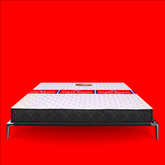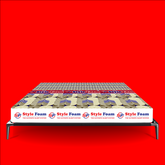A good night’s sleep begins with the right mattress. Whether you’re waking up with aches and pains, tossing and turning all night, or simply not feeling rested, your mattress could be to blame. The right mattress doesn’t just enhance your sleep—it transforms your quality of life. In this guide, we’ll walk you through everything you need to know to find the perfect mattress that delivers both comfort and support.
Why the Right Mattress Matters
We spend roughly one-third of our lives sleeping. That’s a lot of time lying on a surface that can either support your body properly—or work against it. A high-quality mattress helps maintain spinal alignment, reduce pressure on joints, and promote uninterrupted sleep. In contrast, a worn-out or ill-suited mattress can lead to chronic back pain, fatigue, and even increased stress.
Key Factors to Consider When Choosing a Mattress
1. Mattress Type
There are several types of mattresses, each offering unique benefits. The best choice depends on your body type, sleep style, and comfort preferences.
-
Memory Foam: Ideal for pressure relief and contouring. Great for side sleepers.
-
Innerspring: Provides good bounce and support. Preferred by those who like a traditional feel.
-
Hybrid: Combines foam and coils. Offers both support and comfort for a wide range of sleepers.
-
Latex: Naturally hypoallergenic and responsive. Excellent for hot sleepers and eco-conscious buyers.
-
Orthopedic: Designed for spine alignment and support. Recommended for people with back and joint issues.
2. Firmness Level
Mattress firmness is highly subjective and depends on body weight and sleeping position:
-
Soft (3–4/10): Suitable for lightweight sleepers and side sleepers who need pressure relief.
-
Medium (5–7/10): Best for combination sleepers and couples with different preferences.
-
Firm (8–10/10): Ideal for stomach sleepers and people over 230 lbs who need more support.
3. Sleeping Position
Your primary sleeping position significantly influences what mattress will work best for you.
-
Side Sleepers: Need a softer mattress to cushion shoulders and hips.
-
Back Sleepers: Require a medium-firm mattress for lumbar support.
-
Stomach Sleepers: Should opt for a firmer mattress to prevent spine misalignment.
Signs You Need a New Mattress
Not sure if it’s time for a replacement? Here are a few signs:
-
You wake up sore or stiff.
-
You feel like you’re sinking or rolling to the middle.
-
The mattress is over 7–10 years old.
-
You sleep better in hotels or other beds.
-
There are visible sagging spots or lumps.
Additional Considerations
Motion Isolation
If you share a bed, motion isolation is crucial. Memory foam and hybrid mattresses tend to absorb movement better than traditional innerspring models.
Temperature Regulation
Some mattresses trap heat, making sleep uncomfortable. If you’re a hot sleeper, look for breathable materials like latex, open-cell memory foam, or hybrid designs with cooling gel layers.
Edge Support
A mattress with reinforced edges is more durable and helps prevent sagging when you sit or lie near the side.
Budget
Mattresses come in all price ranges—from $300 to over $3,000. While higher-end models may offer more features and durability, many affordable options still deliver excellent support and comfort.
Popular Mattress Brands to Consider
Here are some top-rated mattress brands in different categories:
-
Luxury: Tempur-Pedic, Saatva, Stearns & Foster
-
Budget-Friendly: Zinus, Lucid, Allswell
-
Eco-Friendly: Avocado, PlushBeds, Naturepedic
-
Best Overall: Nectar, Casper, Helix
How to Test a Mattress Before Buying
Even if you’re shopping online, many mattress brands offer risk-free trials—typically 90 to 365 nights. Take advantage of these trial periods to test comfort, support, and how well the mattress holds up over time.
In a store, lie down in your natural sleeping position for at least 10–15 minutes. Don’t be shy—it’s a long-term investment!
Tips to Prolong Mattress Life
-
Rotate regularly (every 3–6 months)
-
Use a high-quality mattress protector
-
Keep your bed frame supportive
-
Clean the mattress surface and vacuum monthly
-
Avoid jumping or excessive weight on one area
The Connection Between Mattress and Health
Studies show a strong link between quality sleep and overall health. A supportive mattress helps:
-
Reduce lower back pain
-
Improve sleep duration and quality
-
Minimize stress and anxiety
-
Boost cognitive function and mood
-
Enhance immune response
Your mattress is more than a sleeping surface—it’s a foundation for better health and daily performance.
Final Thoughts: Invest in Rest
Finding the perfect mattress might feel overwhelming, but it’s worth the effort. With the right balance of comfort and support, your mattress can drastically improve your sleep and well-being. Don’t settle for restless nights and groggy mornings—invest in a mattress that supports your body and your life.












